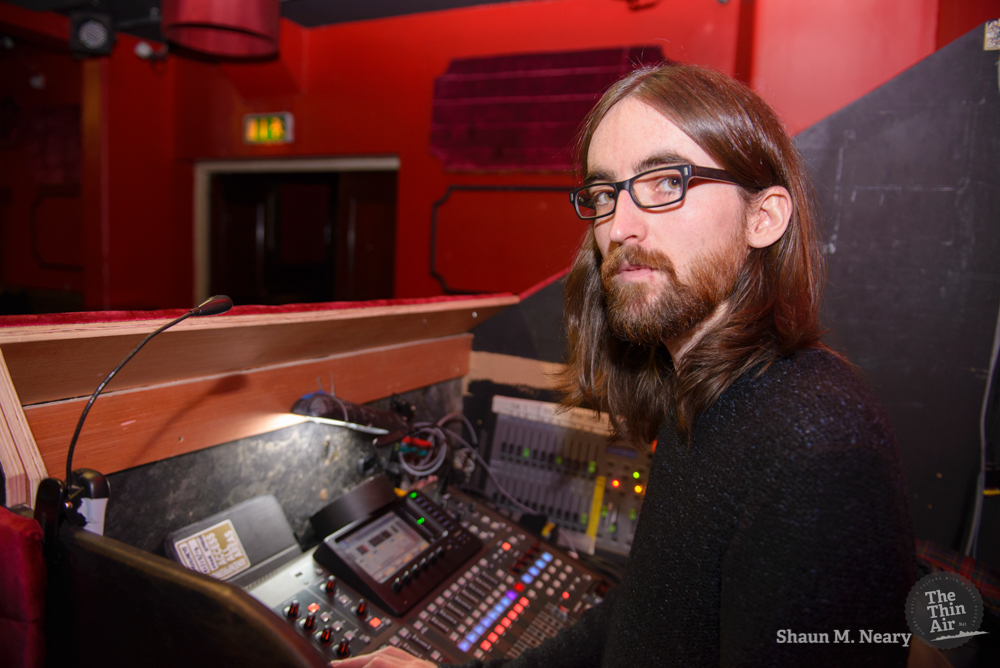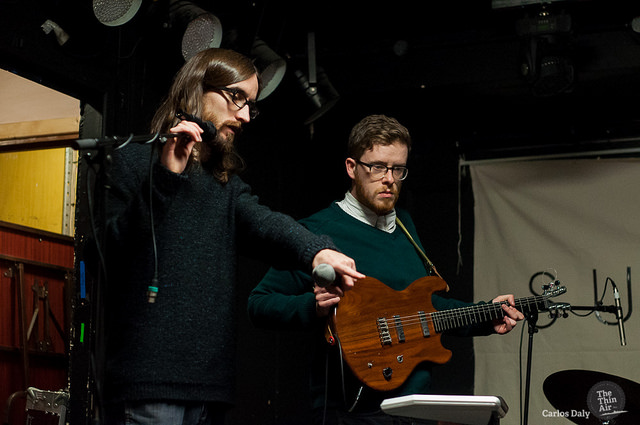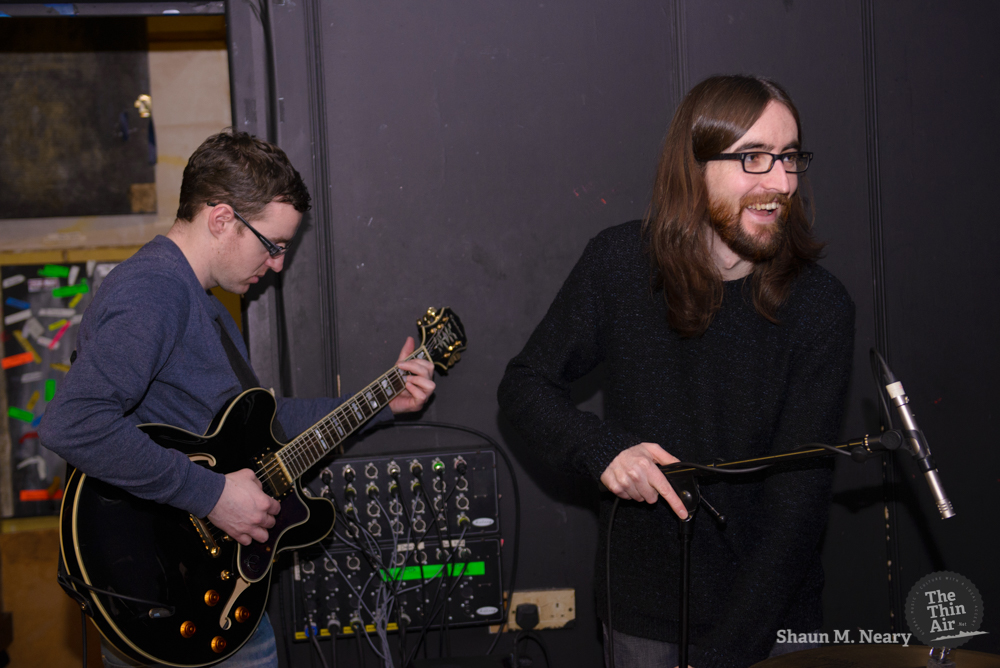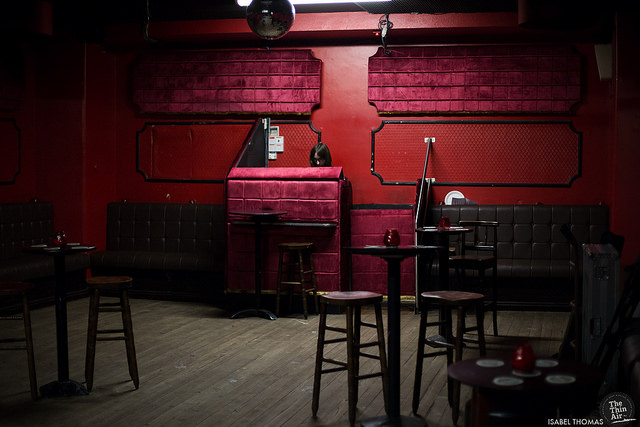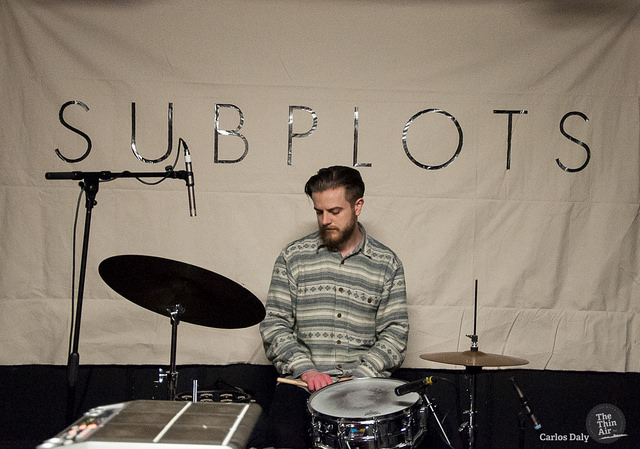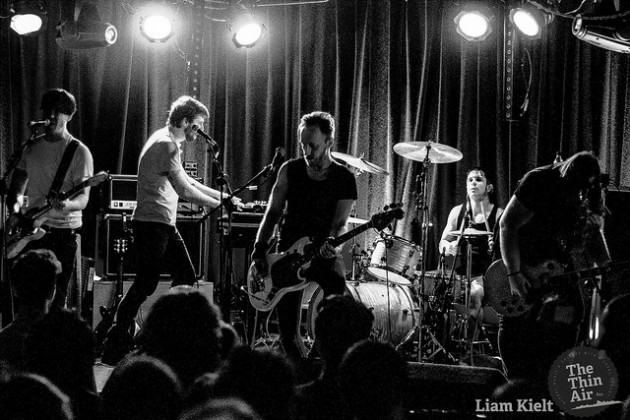In the third installment of our Front of House series, we chat to James Feeney, a sound engineer working predominantly at The Workman’s Club in Dublin. He discusses what goes into his job and and his plans for 2015. Photos by Shaun Neary, Carlos Daly and Isabel Thomas.
Hi James! Can you tell us a little bit about yourself?
Hello! My name is James Feeney, I’m based in Dublin and currently working as a freelance sound engineer. I primarily work in The Workmans Club but there are a few bands I work with quite often too.
How did you become a sound engineer and how long have you been involved in it?
I’ve been working for around 9 years now. When I finished school I went to Pulse College for one year, then I was lucky enough to shadow an engineer that worked full time in a venue, which eventually led to me covering gigs for him, and then when he moved away, I took over as the house engineer.
Can you explain what goes into the job?
Doing a course is important to get a basic understanding of the technical side of things, you shouldn’t really be around a live show environment unless you have a decent understanding of how things work, there’s a lot of expensive gear at risk! I personally found that getting actual experience in the real world, sitting in on gigs and learning from other engineers, was very beneficial. Different people have their own approach to getting a gig up and running and sounding great, so when you’re starting off it’s good to see the different techniques engineers use to get their desired result. It’s the type of industry where you never really stop learning, which keeps it from getting boring. It’s like anything really, the more time you dedicate to learning and honing your skills, the more you get from it.
How does your job differ from venue to venue?
Every venue and room sounds different, the size and shape of the room, the PA and console being used, even the genre of music being played are all factors. A good house engineer can make your life a lot easier if you are touring with a band. It’s always nice to arrive at a venue and have everything ready to go, the house guy will have some good pointers about the room, any spots in the room with weird problems, how the sound in the room changes when the audience are in etc. On the other hand, a venue with an unhelpful crew/engineer can be a nightmare!
James setting up with Phil from Subplots at their album launch last week at The Workman’s Club.
Describe your typical work day.
I like to arrive before the band if I can and make sure the stage isn’t a mess and even get some mics patched in if I received a stage plan/channel list. Once the band arrive I’d help them load in and get their gear set up. Then it’s soundcheck. Once the band are comfortable and happy on stage and I’m happy with the room mix I move on to any support acts. If you’re lucky and everything runs on time you might get a break, if not it’s straight into the show. Once the gig ends I’ll start packing away the mics/cables, once everything is back in its place I’ll help the band load out if I can. If there is a club or DJ on after the bands then it’s up to me to make sure that the changeover runs as smoothly and quickly as possible. 11/12 hours of work are normal. Coffee is your friend!
Can you tell us about the set up/equipment you use?
Set ups vary quite a bit, most small/medium sized venues would have a permanently installed PA, most bands playing at that level wouldn’t have progressed to the stage of carrying their own PA or consoles etc. For the bigger venues usually a whole PA, monitor and lighting rig would be touring with the band, along with their own crew.
In The Workmans, we upgraded the PA last year to an EAW system, along with new EAW monitors. It’s great, it really works better in the room than the old system, the room coverage is a lot more even and we have a lot more low end power available if we need it!
When I first started digital consoles were only beginning to become popular, most venues were still using Analog gear, including the venue I worked in. These days digital consoles seem to be the standard in most places, they are pretty versatile, you can save and recall shows, which is really useful. They also take up a lot less floor space and are easier to travel with.
What are the biggest problems you encounter in your line of work?
Most problems arise from a lack of communication between the different parties involved in putting on a show, if one person gets a vital piece of information wrong, or forgets something, it can be a disaster. That’s why good tour managers and production managers are so important!
Any gig disasters you’d like to share?
The first venue I worked in flooded. I arrived for work and was met with knee deep water on the dancefloor where two of our d&b subs were set up! Luckily after a few days of drying them out they were still working but it was a worrying few days.
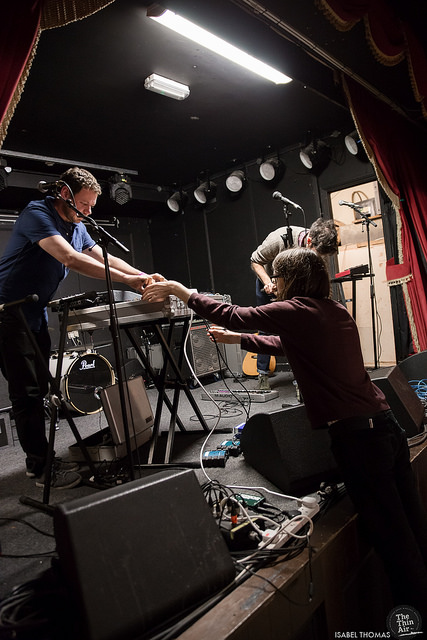
Helping Harry from Carriages set up at The Workman’s Club.
Have you ever gone on tour with a band to do their sound?
I’ve toured Europe a bit. It can be tough going, a lot of time spent sitting in a bus and you can never seem to get enough sleep. It’s also a lot of fun too though, if you are with a small enough group it becomes almost like a surrogate family for a while, which is nice.
Where’s your favourite venue to work in Ireland?
I think Vicar Street would have to be my favorite venue, both to work in and to go to as an audience member. I’ve never been to a bad sounding gig there and the house crew are incredibly nice and easy to work with, it’s always a pleasure to be there.
Soundcheck with a smile! James setting up in The Workman’s Club.
Who is the most interesting band you’ve worked with?
I currently work with a Dublin band called Meltybrains? They’re very experimental musically and visually and their shows are always a lot of fun to work on, you never know what is going to happen! I also mixed a band called The Music Tapes before, they were very interesting, they had lots of unusual things going on including a TV with a face made out of static that would join in at certain points in songs, they were also a lot of fun to work with.
What would be your dream gig to work on?
Any gig where the band, house crew and gear are all good is a dream to work on!
What upcoming gigs will you be working at for 2015?
I’m looking forward to heading to Texas for SXSW with Meltybrains? in March. Then once the summer starts it will be the usual festival madness. Who knows what else will pop up between now and then.
Where can we find more information about you?
I don’t have a website or anything, you’ll just have to go to more gigs!

